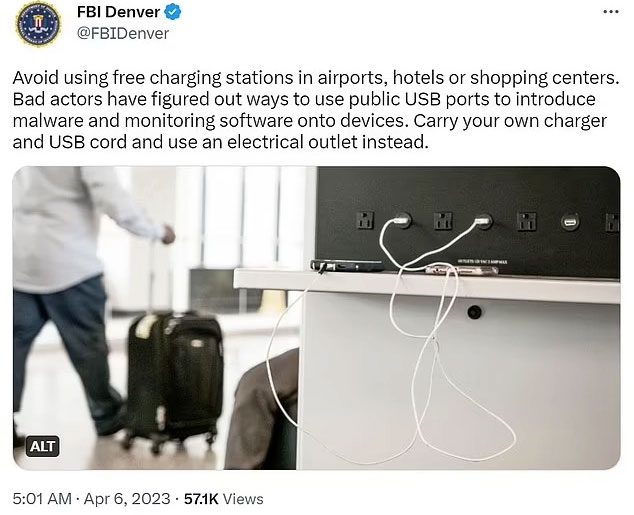Recently, the Federal Bureau of Investigation (FBI) in the United States issued a warning to the public against using free charging stations. Instead, they recommend bringing your own charger and USB cable to plug into wall outlets in public places.

FBI Warning about Public Charging Stations.
While it is undeniable that charging stations are quite convenient for when your phone or electronic device needs power, they come with risks, even if you are very careful about protecting your personal information.
The FBI states that these free public charging stations in the U.S. have become the “latest weapon” for cybercriminals to spread malware and spyware into users’ devices.
Once infiltrated, these malicious actors can steal personal information such as account login details, passwords, credit card information, and even photos… and potentially back up all the data on your phone.

Public charging stations have become the “latest weapon” for cybercriminals to spread malware.
Here are some additional troubleshooting tips to protect yourself from becoming a victim of these scams:
- Bring your own portable charger or power bank.
- Carry your own charging cable.
- If you must use a public charger, do not send or receive data while charging.
- Never plug your device into pre-existing cables, as authorities warn that in some cases, criminals intentionally leave these cables to trick you.
Too many traps are laid in the digital age.
The FBI’s website states: “Your everyday activities—such as opening email attachments, clicking on links in text messages, or shopping online—can put you at risk of encountering online criminals trying to steal your assets.”
“Preventing internet crime and network breaches requires each of us to be aware and vigilant.”
The agency urges the public not to conduct sensitive transactions, such as purchases, on devices before connecting to public internet.
Hackers have become incredibly “creative” over the past decade. They constantly devise new, subtle methods to infiltrate people’s devices to steal personal information.
The FBI advises individuals to check email addresses in all correspondence, carefully examine website URLs, and avoid clicking links in unsolicited text messages.
Recent data shows that Americans are being bombarded with over 376 million scam text messages daily, impersonating Netflix, Amazon, and banks to steal money.
These spoofed messages inform users that their accounts are frozen or that their credit cards have expired, prompting them to click on links requesting personal information.
“If you receive a text message asking for personal or financial information, do not click on any links. Legitimate companies will not ask for your account information in writing,” warned the Federal Trade Commission (FTC) of the U.S. “If you think the message might be real, contact the company using a phone number or website you know is legitimate, not the information in the text message you received.”
Mobile devices have transformed our lives in ways we could never have imagined, but they have also become a vital tool for scammers to exploit.
The Federal Communications Commission (FCC) reported that from 2015 to 2022, the number of complaints about scam messages skyrocketed from 3,300 to 18,900 per year.
Americans lost $10 billion to these frauds in 2021 alone.
FCC Chair Jessica Rosenworcel stated in a release: “Scammers have discovered that sending us messages about a package you never ordered or a payment that was never made, along with a link to a shady website, is a quick and easy way to make us become targets.”


















































